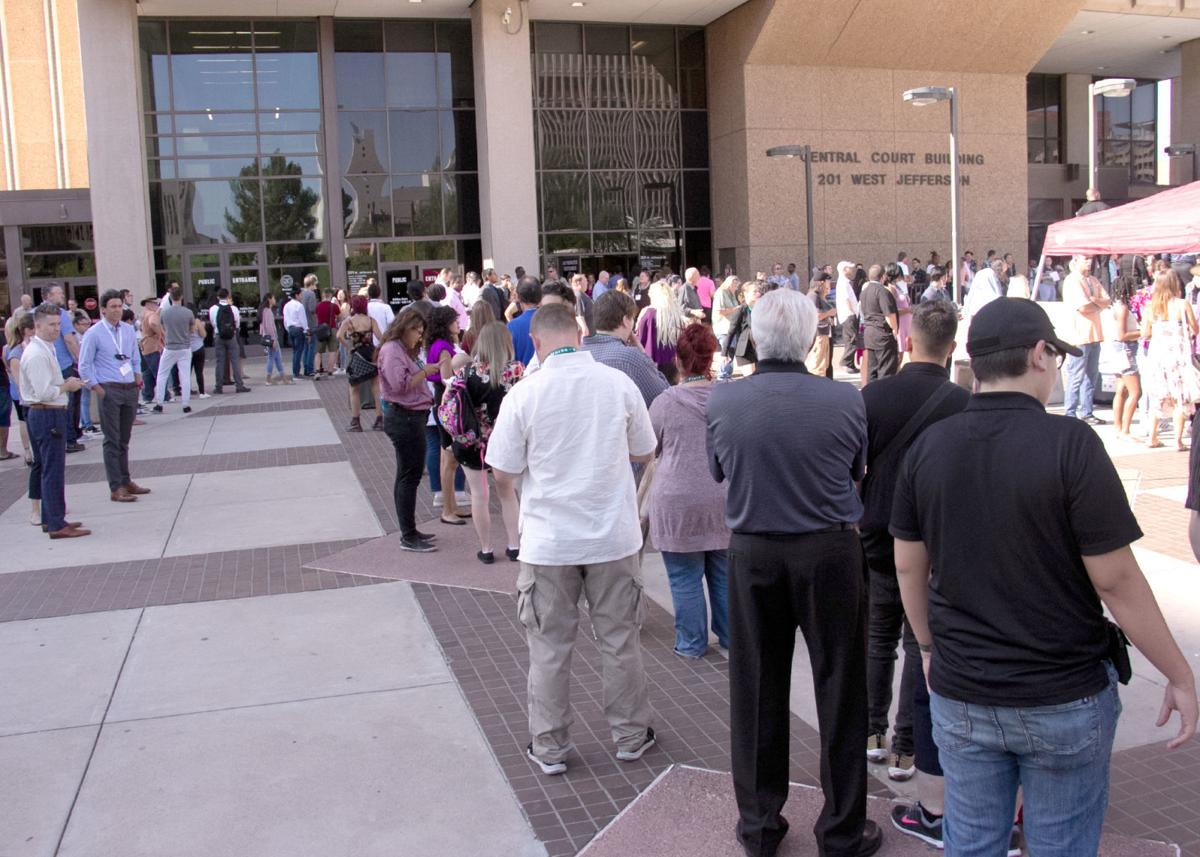PHOENIX — A new lawsuit seeks to strike down a statute that can invalidate otherwise legitimate and qualified signatures on an initiative petition.
The requirement unconstitutionally “discourages the people of Arizona ... from exercising their fundamental right to make law without consulting the Legislature,” said attorney Sarah Gonski, representing one of the plaintiffs, Next Gen Climate Action Committee.
They are asking U.S. District Court Judge Susan Bolton to block Secretary of State Katie Hobbs from enforcing the requirement.
The statute in question was upheld just this past year by the Arizona Supreme Court. But Gonski is trying a different path of attack, alleging that it runs afoul of protections in the U.S. Constitution.
Arizonans can propose their own constitutional amendments and laws by gathering enough signatures to put the issue directly to voters.
The 2014 law, which passed in the Legislature without significant debate, spells out that paid circulators and those who do not live in Arizona must first register with the secretary of state or their collected signatures do not count.
More significant, it allows opponents trying to keep a measure off the ballot to subpoena those circulators. And if any circulator who has to register does not show up, all the signatures that person gathered can be struck, potentially leaving the petition drive short of its goal.
The Next Gen Climate Action Committee pushed an unsuccessful Arizona ballot measure last year to impose new renewable energy mandates on utilities.
Gonski said the statute has taken its toll, citing the experience of Jessica Miracle, a paid petition circulator on that measure.
Subpoenaed by foes of the measure, Miracle could not attend because her children were sick, she did not have her own transportation to Phoenix and no one would tell her clearly how many days she would need to be in Phoenix, the lawsuit says.
The result, according to Gonski, was that all of the 2,604 signatures Miracle gathered were invalidated.
Gonski argued the law is not just unfair to circulators. One of the plaintiffs in the lawsuit is Mary Katz, listed as a Phoenix resident and registered voter.
Katz signed the renewable energy measure, Gonski said. “But her signature was later invalidated when the circulator who witnessed it was unable to appear in court when subpoenaed,” the lawsuit states.
Katz was not told until long after the election that her signature has been invalidated, Gonski said, meaning there was no way for her to go to court to tell the judge it was, indeed, a valid signature.
The other key plaintiff in the case is Arizonans for Fair Lending, which is currently circulating petitions to enact a law to outlaw title loans.
Rod McLeod, who is managing that campaign, said the law has now become a tool for challengers to use to keep measures opposed by certain business interests from ever getting to voters.
He pointed out that challengers to the renewable energy measure issued subpoenas for about 1,180 circulators. McLeod said it was clear from the start there was no way they were going to question that many people in the one week the judge had set aside for trial.
In fact, Gonski said, out of the 913 circulators who appeared, 872 were sent home without ever being asked a single question about their work.
McLeod said challengers know that, using the massive subpoenas “just for intimidation” in hopes that some people would not show up, allowing all the signatures they gathered to be voided.
That could become an issue again, as his organization seeks to obtain the 237,645 valid signatures it needs by July 2 to put the title loan measure on the 2018 ballot.
The tactic of issuing subpoenas to disqualify signatures worked last year, though it didn’t involve nearly as many subpoenas.
At issue then was an initiative to insert a “right-to-know” provision in the Arizona Constitution, requiring any group seeking to influence a political race or ballot measure to reveal the identity of anyone who contributed more than $10,000.
Challengers issued subpoenas for 15 circulators, leaving them with a security guard at an office building used by a company that had hired the paid circulators. When none appeared, the judge disqualified the 8,824 signatures they had collected, leaving the petition drive short.
Attorney Kim Demarchi challenged the law in that case in a bid to put the “Outlaw Dark Money” measure on the ballot. She argued that a circulator’s signatures should be tossed only when there is a “valid objection” to the circulator or the “need for a circulator’s testimony.”
But Arizona Supreme Court Justice John Lopez, writing for the unanimous court, said the constitutional right of people to propose their own laws and constitutional amendments “is, and must be, subject to reasonable regulation.”
He said requiring circulators to appear in court — and tossing their signatures if they don’t show — “furthers the constitutional purpose of the initiative process by ensuring the integrity of signature gathering by reasonable means.”
Gonski, in her new lawsuit, argues to Bolton that the law is unfair and discriminatory.
She pointed out that lawmakers decided the requirement to register paid and out-of-state circulators — and allowing their signatures to be struck if they don’t show up — applies only to ballot measures and not to nominating petitions for political candidates.
“There is no evidence to suggest that initiative petitions are more susceptible to fraud than candidate nomination petitions, nor that paid or out-of-state circulators are in need of special punishment above and beyond other circulators to compel their attendance in court,” she wrote.
A spokeswoman for Hobbs, who is the defendant in the case, said her office was reviewing the challenge.





